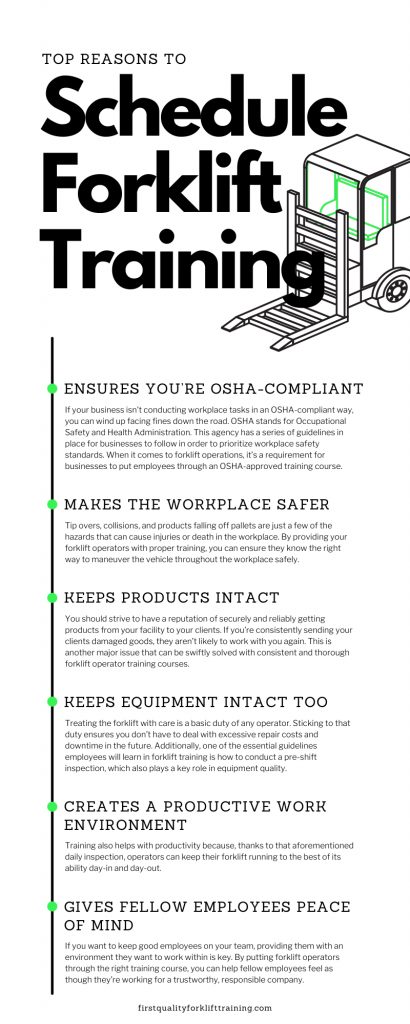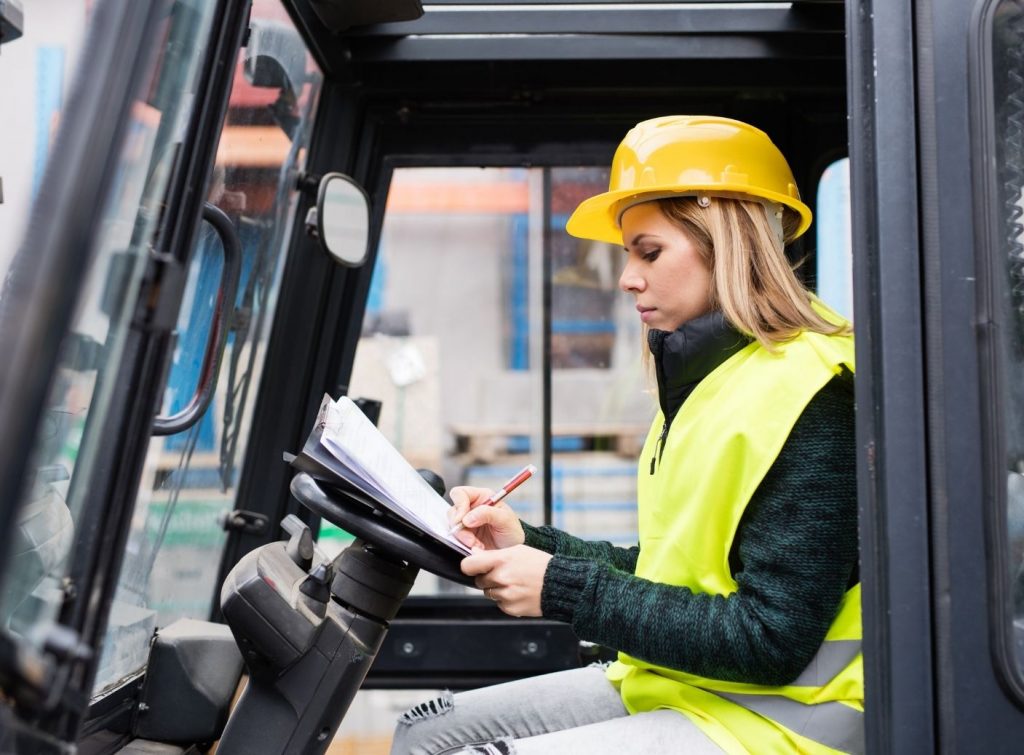Forklift Training & Certification
Top Reasons To Schedule Forklift Training
Forklifts play a crucial role in workplaces across the world. If you’re hiring new forklift operators, it’s crucial to send them through a reliable training course beforehand. Doing this isn’t just a benefit—it’s a necessity.
Forklift training consists of an initial training class, similar to what you’d see at a driving school. Attendees learn the ropes of forklift operating and receive a quiz that tests their knowledge on the subject.
Once they go through the initial classroom section of the course, the operators-in-training must go through a hands-on evaluation. If you’d rather take a “learn on the fly” approach to training your operators, read through these top reasons to schedule forklift training for all news employees. That “on the fly” approach isn’t going to cut it with these heavy machines.
Ensures You’re OSHA-Compliant
If your business isn’t conducting workplace tasks in an OSHA-compliant way, you can wind up facing fines down the road. Plus, if your lack of compliance leads to an employee’s death, the consequences will be much direr. Don’t worry—avoiding that is both easy and beneficial to your overall workflow.
OSHA stands for Occupational Safety and Health Administration. This agency has a series of guidelines in place for businesses to follow in order to prioritize workplace safety standards. When it comes to forklift operations, it’s a requirement for businesses to put employees through an OSHA-approved training course.
Likewise, employees must commit to a daily inspection of their forklift that abides by OSHA specifications as well. Knowing what OSHA asks for your business is important. Training is just one of the many important guidelines you’ll have to stick to if you want to keep the workplace reliable, safe, and OSHA-compliant at all times.
Makes the Workplace Safer
There is a bevy of mistakes that can happen in the presence of improper forklift operating procedures. Tip overs, collisions, and products falling off pallets are just a few of the hazards that can cause injuries or death in the workplace.
By providing your forklift operators with proper training, you can ensure they know the right way to maneuver the vehicle throughout the workplace safely. Moving too fast, turning too sharply, and other unsafe actions are simple mistakes that can have severe consequences.
Keeps Products Intact
As mentioned above, improper operating procedures can cause products to fall off of the forklift. If those products fall from the forks, they can obviously become a danger to anyone below them. However, even if no one is hurt from this accident, the products themselves can receive immense damage in the process.
Suffice it to say, that’s not going to make clients happy. You should strive to have a reputation of securely and reliably getting products from your facility to your clients. If you’re consistently sending your clients damaged goods, they aren’t likely to work with you again. This is another major issue that can be swiftly solved with consistent and thorough forklift operator training courses.
Training doesn’t just pertain to forklift operation. Knowing how to correctly load products onto the forks is just as important as knowing how to operate the vehicle itself. Even if an operator is driving safely and responsibly, an unstable load can present a danger to employees and an easy way for products to receive damage.
Keeps Equipment Intact Too
Tip overs, collisions, and falling products aren’t just a danger to employees—they’re a danger to the forklift too. Maintenance is always going to be a necessity with forklifts, but improper handling can make the need for repairs become more and more necessary.
Treating the forklift with care is a basic duty of any operator. Sticking to that duty ensures you don’t have to deal with excessive repair costs and downtime in the future. Additionally, one of the essential guidelines employees will learn in forklift training is how to conduct a pre-shift inspection, which also plays a key role in equipment quality.
By sticking to an OSHA-compliant daily inspection procedure, operators can conduct upkeep and spot any damages to the forklift, such as leaks or severely damaged forks. A daily inspection might sound excessive, but it’s far from it. That daily inspection is a crucial process that will keep the workplace safe for everyone nearby.
Creates a Productive Work Environment
By receiving thorough training prior to becoming a forklift operator, employees should feel comfortable behind the wheel instead of feeling lost. In fact, the hands-on training course should occur at the facility the employee is going to work at, with the forklift they’ll be operating. Training like this gives employees a clear advantage on day one.
Instead of the usual growing pains that come with starting a new job, especially one as technical as this, operators can be ready to go on their first day. Of course, operators should feel comfortable asking for help with tasks like spotting while reversing and other specific situations like that. However, when it comes to the basics, training will answer the essential questions.
Training also helps with productivity because, thanks to that aforementioned daily inspection, operators can keep their forklift running to the best of its ability day-in and day-out. Refusing to conduct that inspection may very well lead to the forklift accruing more and more damage, which will ultimately hinder its performance in the field.
Gives Fellow Employees Peace of Mind
It’s important for business owners and facility managers to provide employees with a comfortable and safe environment to work in. If employees feel unsafe because of reckless forklift operators constantly zooming around, it’s likely they’ll hop on the next job opportunity to find.
If you want to keep good employees on your team, providing them with an environment they want to work within is key. By putting forklift operators through the right training course, you can help fellow employees feel as though they’re working for a trustworthy, responsible company.
After looking at these top reasons to schedule forklift training, it should become very apparent why this step of the hiring process is so paramount. Untrained forklift operators can lead to unnecessary costs, equipment damage, and safety hazards becoming a normal occurrence.
As a business owner, it’s your responsibility to understand and abide by the OSHA forklift training requirements. By committing to these requirements on a daily basis, you’ll make your warehouse more responsible, reliable, and productive.



